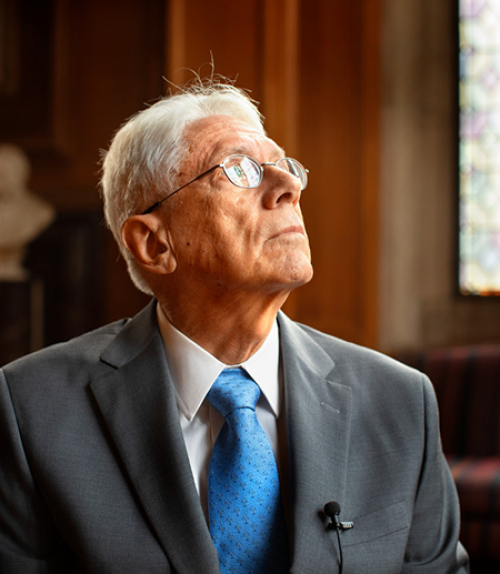Keith Taylor didn’t want to be a veteran.
“I just wanted to be a normal person and put it all behind me,” said Taylor, professor in the Department of Asian Studies in the College of Arts and Sciences, who served in the U.S. Army in the Vietnam War. “But it was an experience that is definitely a big, important part of my life. It made me grow up really fast and think about things most people don’t have to think about: What is worth living and dying for? What do I think about this country, and how do I relate to it?”
More than 50 years after he enlisted, Taylor said Veterans Day has taken on a personal meaning for him. That’s in part because his son, now an adult, always sends him a message; it’s also become an opportunity to reflect.
“It just makes me remember why my Army and wartime experiences were important,” said Taylor, a specialist in Sino-Vietnamese cultural studies. “Frankly, every day, whatever I’m doing – teaching, researching, writing, being with friends – that experience is always in the back of my mind somewhere. You can’t erase it. I don’t want to put it front and center, but it’s given me a certain strength in the sense that I know what I believe. I know why.”
As a scholar, Taylor has written about Vietnamese history and literature, including in his most recent book, “A History of the Vietnamese.” He also pioneered the teaching in North America of literary Vietnamese in the character script based on literary Chinese called chữ Nôm.
“Teaching about Vietnam, teaching about the war,” he said, “is some way to make something good out of a bad experience.”
Taylor enlisted following his graduation from George Washington University in 1968. After basic combat training, he participated in an intelligence course at Fort Holabird in Baltimore, where he and his cohort trained intensively for months in the covert collection of intelligence outside the U.S. (Information about much of their training and subsequent activities remains classified.)
Taylor then spent nearly a year studying Vietnamese language at the Defense Language Institute in Virginia before being deployed to Vietnam in 1970.
“It was pretty unorthodox compared to the rest of the Army,” he said of his intelligence work. “We were asked to do things most people only read about in thrillers. We had successes and failures. We experienced both tedium and terror. But we served to the best of our abilities, and after discharge got on with our lives.”
For Taylor, that meant a return to school: He attended graduate school at the University of Michigan, where, because of his Vietnamese language skills, he studied with a professor specializing in Vietnamese history. He received a Ph.D. in 1976, and taught in Japan and Singapore before returning to the U.S. In 1989, he took a position at Cornell.
He spent two years in Hanoi in the early 1990s, and has returned to Vietnam almost every year since. Learning about the country’s history, people and culture has changed the perspective he had as a young man, Taylor said.
“When I got out of the Army, I was quite demoralized in many respects,” he said. “We were withdrawing, so those of us who were left there, being asked to fight a war our country was no longer supporting, were disenchanted. I needed to think it through for myself, and it took many years to do that.
“But I’ve done it enough that I know what I think,” he said, “and I know that what I think is what I’ve worked out for myself, rather than just accepting other people’s ideas.”
For example, he believes that contrary to much public opinion, the United States did have a good reason to fight in Vietnam, and that insufficient attention has been paid to the plight of the South Vietnamese.
This summer, Taylor attended a reunion of his Army comrades – their first gathering in 50 years.
“It was amazing, because it was as if all those years had never passed,” he said. “We’re all different – different religions, different politics, different experiences – but we were all also very much similar.”
While his Army service doesn’t define him, Taylor said it undoubtedly had a major impact on his identity, as well as his career.
“When we signed up for Army intelligence, none of us knew where it would take us,” he said. “For me, it determined the academic focus of the rest of my life.”
This story originally appeared in the Cornell Chronicle.




